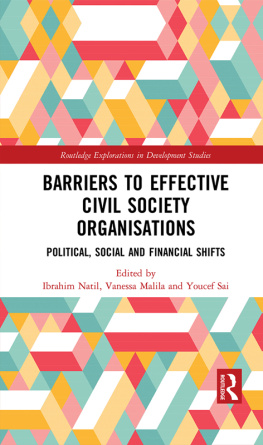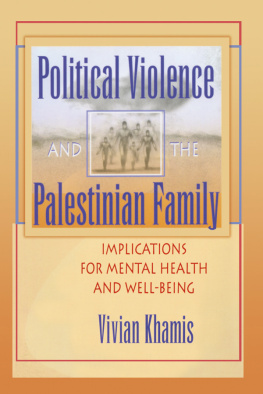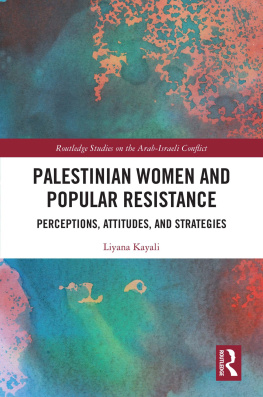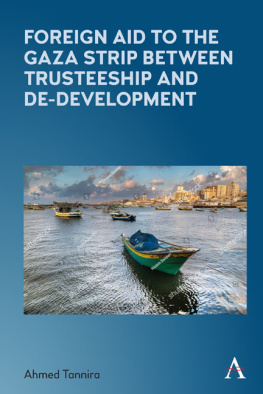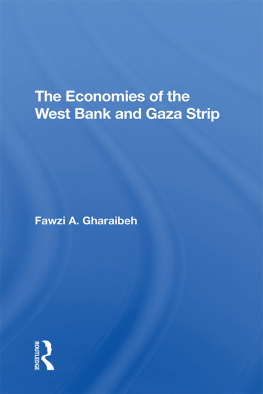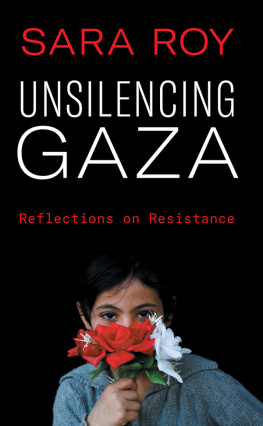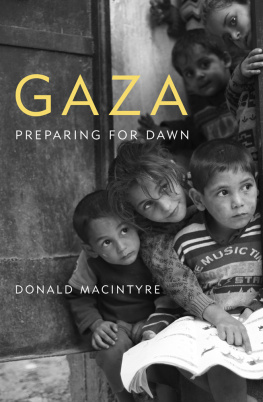CONFLICT, CIVIL SOCIETY, AND
WOMENS EMPOWERMENT
CONFLICT, CIVIL SOCIETY, AND
WOMENS EMPOWERMENT
Insights from the West Bank and
the Gaza Strip
BY
IBRAHIM NATIL
Dublin City University, Ireland
United Kingdom North America Japan India
Malaysia China
Emerald Publishing Limited
Howard House, Wagon Lane, Bingley BD16 1WA, UK
First edition 2021
Copyright 2021 Emerald Publishing Limited
Reprints and permissions service
Contact:
No part of this book may be reproduced, stored in a retrieval system, transmitted in any form or by any means electronic, mechanical, photocopying, recording or otherwise without either the prior written permission of the publisher or a licence permitting restricted copying issued in the UK by The Copyright Licensing Agency and in the USA by The Copyright Clearance Center. No responsibility is accepted for the accuracy of information contained in the text, illustrations or advertisements. The opinions expressed in these chapters are not necessarily those of the Author or the publisher.
British Library Cataloguing in Publication Data
A catalogue record for this book is available from the British Library
ISBN: 978-1-80071-061-0 (Print)
ISBN: 978-1-80071-060-3 (Online)
ISBN: 978-1-80071-062-7 (Epub)
CONTENTS
ABBREVIATIONS
Civil Society Organisations (CSOs)
Development Assistance Committee (DAC)
European Union (EU)
International Non-Governmental Organisations (INGOs)
Islamic Resistance Movement (Hamas)
Non-Governmental Organisations (NGOs)
Occupied Palestinian Territories (OPT)
Organisation for Economic Co-operation and Development (OECD)
Palestinian Authority (PA)
Palestinian Central Bureau of Statistics (PCBS)
Palestinian Liberation Organisation (PLO)
Palestinian National Liberation Movement (Fatah)
Palestinian Non-Governmental Organisations Network (PNGO)
United Nation Development Programme (UNDP)
United Nation Security Council Resolution (UNSCR)
United Nations Office for the Coordination of Humanitarian Affairs (OCHA)
United Nations Relief and Working Agency (UNRWA)
United States Agency for International Development (USAID)
Womens Young Islamic Association (WYIA)
ACKNOWLEDGEMENTS
There are so many friends and colleague to acknowledge. However, I am especially grateful to all activists who provided their generous time, views and information. Their great help and views have assisted me to enrich the debate and discussions.
This book, however, could not have been completed without the full support of Society Voice Foundation, whose staff and volunteers facilitated and provided me with great assistance, facilitating and organising interviews and assisting in accessing information and data.
Finally, this book would not have been completed without the support and patience of my family: wife, children and parents, whose understanding and encouragement boosted my efforts. Special thanks to all Palestinian women who suffer tough political, social and economic circumstances during all times.
1
INTRODUCTION
The ; Wildeman, 2019).
Activists experience of occupation policies exercises power, which focuses on controlling and disciplining bodies. These policies of violence and control create insecurity in their daily experiences of conflict; however, their peaceful resistance to the occupation can be found embedded within daily life in the Occupied Palestinian Territories (OPT) (). Peaceful civil society activists power can also be embedded in non-violent struggle and popular protest despite the fact of the uncertain future of unarmed resistance in the OPT (Darweish & Rigby, 2015).
).
CSOs include a diverse set of organisations, ranging from small, informal, community-based organisations to the large international NGOs working through local CSOs across southern countries (UNDP, 2013, p. 123). With a diverse range of CSOs, objectives and actions that target local, national and international issues, the CSO sector is an expansive terrain characterised by dynamic relationships between agents of action, the causes they serve and the communities that benefit from their activities () discusses the barriers facing civil society and their abilities to cope with and operate within shifting conditions, restrictive political environments and despite the complexity of the sociocultural and economic context. Occupying the ground between business and government, the CSO sector faces a number of regulatory and financial challenges that affect its overall health and sustainability (Natil, 2020, pp. 1017).
Although the Development Assistance Committee of the Organisation for Economic Co-operation and Development (OECD) has traditionally used the term NGO, NGOs have included participatory elements in their programmes and functions as Bherer, Dufour, and Montambeault (2016) argue. OECD, however, has adopted the definition of CSOs:
[CSOs] can be defined to include all non-market and non-state organisations outside of the family in which people organize themselves to pursue shared interests in the public domain. Examples include community-based organizations and village associations, environmental groups, womens rights groups, farmers associations, faith-based organizations, labour unions, co-operatives, professional associations, chambers of commerce, independent research institutes and the not-for-profit media. (OECD, 2011, p. 10)
In Palestine case, ) argues that:
the rise of NGOs can be seen to have resulted in a shift in power relations from power to women at the grassroots to power over them by the new elite.
This type of NGOs generated conflicts with forms of mass-based organisations over legitimacy, resources and space in public arenas. The NGOisation process in the post-Oslo process led a pressure on womens organisations to shift their role from mobilisation and liberation agenda to a state-building and claiming rights, empowerment and equality as Jad (2018) argues. Is Womens CSOs activism, however, is considered a form of grassroots engagement and a process of participatory democracy? Is active participation in local organisations, student unions, social movements, CSOs and NGOs a form of participatory democracy in responding to the lack of a democratic process in a conflict zone? CSOs always seek to explore a new space for activists social and political engagement by managing community development and post-conflict reconstruction, as well as improving humanitarian lives. The participatory practices have also expanded in a variety of unexpected public and private spaces. Hilmer (2010) and Aragones and Snchez-Pags (2009) discuss the definition and concept of participatory democracy where active citizens have the power to decide on change of their future. CSOs attempt to show the advantages of working for mutual benefit with tangible results between different groups to engage victimised in participating in social and political activities. The participatory process is also associated with the practice of a top-down mechanism conducted to include citizens engagement and contribution to the public sector as Bherer et al. (2016) argue.


